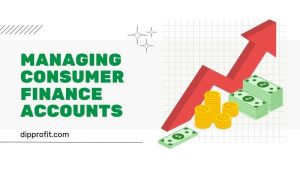Consumer finance accounts play a crucial role in the financial lives of individuals and families around the world. These accounts encompass a wide range of financial products and services designed to meet the diverse needs and goals of consumers.
In this comprehensive guide, we will delve into the world of consumer finance accounts, exploring their various types, benefits, and considerations. By the end of this article, you will have a clear understanding of what consumer finance accounts are and how they can help you manage your finances effectively.
What Are Consumer Finance Accounts?
Consumer finance accounts, often referred to as retail banking, personal finance accounts, or personal loan accounts, are financial tools provided by banks, credit unions, and other financial institutions to individuals and households. These accounts are designed to help consumers manage their money, save for the future, borrow funds, and achieve their financial goals.
Types of Consumer Finance Accounts
There are several types of consumer finance accounts, each serving different purposes: Here are a few worth mentioning;
- Checking Accounts
- Savings Accounts
- Certificates of Deposits
- Money Market Accounts
- Credit Card Accounts
- Personal Loans Accounts
Checking Accounts
A checking account is a type of consumer finance account provided by banks and credit unions that allows individuals to deposit money, make withdrawals, and conduct various financial transactions. These accounts are designed for everyday use and typically offer features like check writing, debit card access, and online banking.
Checking accounts provides a convenient way for account holders to manage their day-to-day expenses, pay bills, and make purchases while keeping their funds safe and easily accessible.
- A checking account is a fundamental consumer finance account used for everyday transactions. It allows account holders to deposit money, write checks, make electronic transfers, and withdraw funds from ATMs.
- Key features: Debit card, check writing, online banking access, bill payment services.
Savings Accounts
The savings account is another type of finance account offered by banks and credit unions that allows individuals to deposit and store their money while earning interest on the balance. Savings accounts are typically used for saving money over the long term, and they provide a safe and secure place to set aside funds for various purposes, such as building an emergency fund, saving for a specific financial goal, or earning a modest return on their savings.
These accounts are known for their low risk and easy access to funds when needed.
- A savings account is intended for storing money over the long term while earning interest. It provides a safe place to save money and build an emergency fund or save for specific goals.
- Key features: Interest earnings, easy access to funds, limited withdrawals per month.
Certificates of Deposit (CDs)
Certificates of Deposit (CDs) are a type of time deposit account, they can also be called a fixed deposit account offered by banks and credit unions. When you open a CD, you agree to deposit a specific amount of money for a fixed period, ranging from a few months to several years. In return, you receive a higher interest rate than what regular savings accounts typically offer.
The key feature of CDs is that you cannot withdraw the funds before the maturity date without incurring a penalty. CDs are considered a low-risk investment and are often used to save for specific financial goals or earn a higher rate of interest on money that you don’t need immediate access to.
- CDs are time deposits that offer higher interest rates than regular savings accounts. They require account holders to leave their money untouched for a fixed period.
- Key features: Fixed interest rates, penalty for early withdrawal, varying term lengths.
Money Market Accounts (MMAs)
Money market accounts (MMAs) are a type of interest-bearing deposit account offered by banks and credit unions. These accounts typically provide higher interest rates compared to regular savings accounts. Money market accounts are known for their liquidity and accessibility, allowing account holders to make withdrawals and write checks (usually with certain limitations) while earning a competitive rate of interest on their deposited funds.
They are considered a relatively safe and low-risk option for individuals looking to grow their savings with some level of flexibility and liquidity.
- Money market accounts are a hybrid of checking and savings accounts. They typically offer higher interest rates than regular savings accounts while providing limited check-writing capabilities.
- Key features: Interest earnings, check writing, higher minimum balance requirements.
Credit Card Accounts
A credit card account is a financial arrangement provided by banks and credit card companies that enables individuals to make purchases on credit. With a credit card, account holders can borrow money to buy goods and services, and they must repay the borrowed amount by a specified due date. Credit card accounts comes with credit limits, interest rates, and often include rewards or cashback programs.
They provide consumers with financial flexibility but require responsible management to avoid accumulating high-interest debt.
- Credit card accounts allow consumers to make purchases on credit, which they must repay by a specified due date. They often come with various rewards and benefits.
- Key features: Credit limit, interest rates, rewards programs, minimum payments.
Personal Loan Accounts and Lines of Credit
Personal loans and credit lines are also a type of consumer finance account that deals with helping individuals with low credit scores or ratings gain access to loans and lines of credit through planning and strategizing. If you’re contemplating securing such a loan, it’s essential to gain a comprehensive understanding, including the various available types. Keep reading to explore consumer finance accounts and determine if they align with your financial needs.
- These accounts enable consumers to borrow money for various purposes, such as home improvements, education, or debt consolidation.
- Key features: Fixed or variable interest rates, repayment terms, credit limits.
See Also: Important Fundamentals of Corporate Finance In 2023
Benefits of Consumer Finance Accounts
Understanding the benefits of consumer finance accounts can help individuals make informed decisions about their financial management. Here are some key advantages:
Convenience
- Checking accounts offer a convenient way to manage day-to-day expenses through checks, debit cards, and digital payments.
Savings and Growth
- Savings accounts and CDs provide a safe place to grow your money over time with the benefit of earning interest.
Emergency Fund
- Savings accounts are an ideal place to build an emergency fund, ensuring financial security during unexpected events.
Access to Credit
- Credit card accounts and personal loans offer access to credit when needed, allowing for major purchases and financial flexibility.
Financial Goals
- Consumer finance accounts help individuals save for specific goals, whether it’s a down payment on a house, a dream vacation, or retirement.
Budgeting
- Tracking expenses and managing finances becomes more accessible with checking accounts and online banking tools.
Considerations When Choosing Consumer Finance Accounts
Selecting the right type of consumer finance account is essential to achieving your financial objectives. Your financial goals among others are a major determining factor in choosing the types of consumer finance account you want to operate. Before choosing the type of consumer finance account you want to operate, consider the following factors:
Financial Goals: Determine your short-term and long-term financial goals to choose accounts that align with your objectives.
Fees and Charges: Be aware of account fees, including maintenance fees, overdraft fees, and ATM withdrawal fees, which can erode your savings.
Interest Rates: Compare interest rates offered on savings accounts, CDs, and MMAs to maximize your earnings on deposits.
Accessibility: Evaluate the availability of ATMs, branch locations, and online banking services to ensure easy access to your accounts.
Credit History: If you’re considering credit card accounts or loans, your credit history will impact the interest rates and credit limits you receive.
Terms and Conditions: Read and understand the terms and conditions associated with your accounts, especially for CDs and credit cards.
See Also: Power Alliance Finance: The Best Car Finance Solution In 2023
Managing Consumer Finance Accounts Effectively
Knowing how to manage your consumer finance accounts effectively is crucial in your financial journey and it is also a key factor in enhancing your financial stability. Below are some basic tips that will assist you in properly managing your consumer finance accounts.
Budgeting: Create a budget to track income and expenses, ensuring you can meet your financial goals and obligations.
Savings: Regularly contribute to your savings accounts, aiming to build an emergency fund and achieve your financial objectives.
Debt Management: Use credit card accounts responsibly and pay off outstanding balances to avoid high-interest charges.
Monitor Accounts: Keep a close eye on your accounts for fraudulent activities and errors, reporting them promptly to your financial institution.
Financial Planning: Seek professional financial advice to plan for retirement, investments, and other long-term goals.
Review and Adjust: Periodically review your consumer finance accounts to ensure they continue to meet your needs and make adjustments as necessary.
See Also: What Is Roth IRA: Here’s The Best Answer In 2023
Conclusion
Consumer finance accounts are integral to managing your personal finances effectively. Whether you’re saving for the future, managing everyday expenses, or borrowing for important milestones, understanding the types and benefits of these accounts is essential.
By considering your financial goals and making informed choices, you can leverage consumer finance accounts to build a secure financial future. Remember to continuously monitor and adjust your accounts to align with your changing needs and circumstances, ultimately achieving greater financial stability and success.



